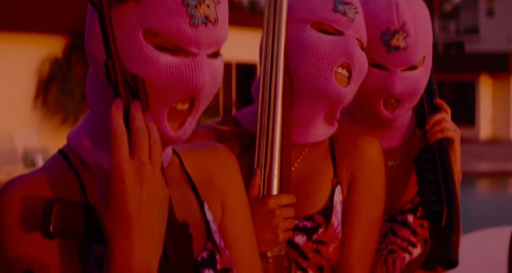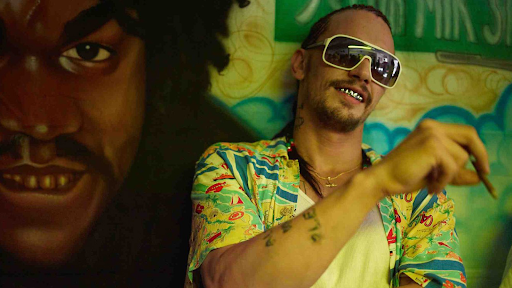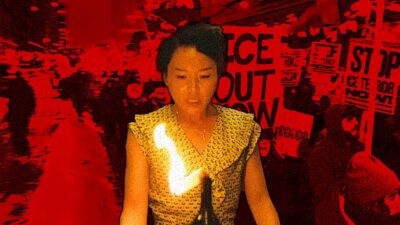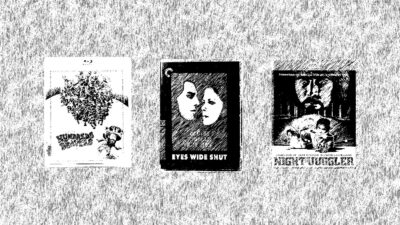In the nine years since Harmony Korine sent middle America into a tailspin with his sleazy SPRING BREAKERS, much has changed in the realm of college partying it satirizes. 2020 alone famously brought with it a pandemic that forced the entire college lifestyle into a hard reset and holding period along with an overdue nationwide reckoning on race and white supremacy.
Which is why it’s particularly troubling just how salient the film feels today.
For the uninitiated: SPRING BREAKERS follows Candy, Faith, Brit, and Cotty, a group of students who go to St. Petersburg for spring break—played, controversially and pointedly, by Vanessa Hudgens, Selena Gomez, Ashley Benson, and Rachel Korine respectively. They meet Alien (James Franco), a rapper and drug dealer who takes the girls under his wing after bailing them out of jail following a busted party. Alien introduces them to his “American Dream” of crime, drugs, and money, and lives are changed. Also, he’s feuding with his best-friend-turned-rival-dealer Archie/”Big Arch” (Gucci Mane), who it bears mentioning is the only Black character. (Alternatively, SPRING BREAKERS is on Hulu, and you can return to this article in an hour-and-a-half. See you soon!)

Much of the film is a music-video-ready display of unbridled hedonism—glossy, sun-soaked party scenes that deftly tow the line of being artful GIRLS GONE WILD videos. Throughout all that hedonism is an unignorable proximity to Blackness, usually without a Black person in sight. Alien exemplifies this most, between his dreads, heavy usage of AAVE, and his clumsy attempts at hip hop.
At the time, one of the film’s many controversies centered on Alien’s similarities to rapper Riff Raff, who Korine originally contacted about playing the role. And, I mean, if the shoe fits…? Riff Raff spoke out against the film, which amounted to nothing—fine, given that being similar to Alien is damning enough. In the years since, his cultural impact has all but vanished, signifying that maybe the culture had moved on.
Enter: Jack Harlow.

If you have been near any college campus with Greek life, you are aware of these artists’ vice grip on members of that scene. These are people we’ve all encountered; they are the people who have let “Young, Wild, & Free” go triple platinum in their universe for the 10th year in a row. They are the ones who wake up at 6 A.M. to tailgate before a midday football game and treat the C-list rapper their school books for a show like a god. (Source: I went to an SEC school, technically, when “Mo Bamba” was a thing.)
For this crowd—which has, remarkably, changed very little since Korine satirized them—proximity to Blackness is an inextricable part of the general culture. Rarely at a tailgate will you hear more than a handful of songs from white artists. Barring an occasional “Mr. Brightside” or “Closer,” these tend to come from people like Harlow. Their work, much like Alien’s (the word “work” feels generous here) has just enough hip hop in it to fit in with this scene without the risk of, say, an N-word scandal.
Back in 2013, Richard Brody identified this dynamic through the lens of Norman Mailer’s 1957 “The White Negro,” which argued that white “hipsters” approximated the experience of Blackness through transgressive behaviors and crimes without experiencing the same perils and positionality as the actual Black community. In SPRING BREAKERS, this looks like the whitest crowd of people you’ve ever seen screaming out rap lyrics.
Korine calls this behavior out most notably by mocking his characters’ internal monologues and obsession with self-actualization. For the girls of SPRING BREAKERS, these moments of experimenting beyond the confines of their white suburban upbringing are revelatory. Party scenes are just as often set to indulgent monologues as they are to Skrillex. All the violence and abuse we as viewers can take at face value does not come across the same way to our central quartet, who view these experiences not as radical life-shifting events but as something they’re trying on.

I’m reminded of Pitchfork’s infamous review of Jack Harlow’s COME HOME THE KIDS MISS YOU, which Matthew Strauss (rightly) dubs vacuous. His swagger falters at the scale of carrying a full-length album. His half-hearted attempts at channeling the coolness of hip hop result in a completely neutered sound that leaves out everything that makes the genre so vital.
The same is apparent in SPRING BREAKERS: St. Petersburg, as we’re allowed to see it, is one nonstop party, mobs of white kids looking to break out of their affluence for a week for their own character development and nothing more. Even Alien, as much as he initially seems to follow such a lifestyle long-term, is performing a caricature of it. His money and his guns are but a means to the end of impressing other people; his “American dream” is ultimately toothless. There is no endgame for Alien, only spring break forever.
We’ve seen countless cultural figures follow the same path—playing with the cool factor Black culture offers only to a point then immediately dipping. Take Post Malone for example, whose first hit “White Iverson” was so titled after he got braids and felt he looked like Allen Iverson. When asked about emotions in hip hop back in 2017, his response (essentially that there are no emotions in hip hop) revealed that his concept of the genre was strictly limited to partying. Once he got his partying fix, his rebrand was swift and unsubtle. His latest, TWELVE CARAT TOOTHACHE, holds few ties to the genre whatsoever.
As for Riff, we haven’t seen the same total pivot from him. Apparently, he’s still releasing music; unlike Post, however, he doesn’t seem to have shifted his focus, with his latest release, 2020’s VANILLA GORILLA, having a title that more than speaks for itself. His fade from the limelight represents the inverse of Post’s journey: rather than him getting bored of trying on Blackness, the public grew tired of his particular brand of trying-on-Blackness. Sexual assault allegations ultimately sealed the deal irreversibly, of course, but Riff was a flash in the pan years before those went public.

Korine has spent a career interrogating the workings of white poverty. Hedonism, crime, and violence are mainstays in his work, dating all the way back to his breakout script for KIDS back in 1995. His films are consistently controversial, with GUMMO infamously receiving its fair share of outright panning for its tendencies toward exploitation. But never has his work been glossier, showier, more quintessentially American than SPRING BREAKERS. Where KIDS, GUMMO, or TRASH HUMPERS showcase the sort of down-on-their-luck hedonism we tend to push aside, SPRING BREAKERS calls into question the type that we encourage and celebrate.
It’s tempting to look at SPRING BREAKERS as a moment in time. The soundtrack, the Riff Raff parallels, the Disney girls gone bad: all of this feels so deeply, quintessentially 2010s. Korine’s characters are such obvious objects of ridicule that it feels almost too easy, a sort of Chainsmokers “#SELFIE” sort of dig. To treat it as such may be easier. Placing all the obvious Mailer-esque dynamics in the past is convenient. But it’s also remarkably dishonest. Past all the petition-signing and anti-racism reading lists and social conscience the country—especially our young adults—try to promote, all these behaviors are as prevalent as they’ve ever been. In spite of everything, America is still living spring break forever.















Comments